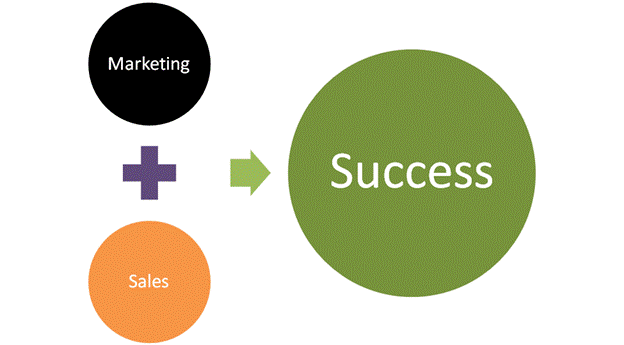Table of Contents
ToggleMany think that marketing and Sales functions are one and the same. Let us define these two functions.
Marketing is finding out what people want, why they want it and how much they’ll spend. Don’t confuse marketing with advertising.
Sales is sales! It’s converting an inquiry or lead into a contract or shipment. Sales is not market research, business development or advertising.
Marketing is everything that an organization does to reach and persuade prospects. The sales process is everything that it does to close the sale and get a signed agreement or contract. Both are necessities to the success of a business. One cannot do without either process. By strategically combining both efforts an organization will experience a successful amount of business growth. However, by the same token if the efforts are unbalanced it can deter your growth.
Marketing will consists of the measures to reach out to and persuade prospects that you are the company for them. It’s the message that prepares the prospect for the sales. It consists of advertising, public relations, brand marketing, viral marketing, and direct mail.
The sales process consists of interpersonal interaction. It is often done by a one-on-one meeting, cold calls, and networking. It’s anything that engages you with the prospect or customer on a personal level rather than at a distance.
Your marketing efforts begin the process of the eight contacts that studies show it takes to move a prospect or potential client to the close of the sale. If marketing is done effectively you can begin to move that prospect from a cold to a warm lead. When the prospect hits the “warm” level it’s much easier for the sales professional to close the sale.
So here are a few useful definitions to help
Marketing
The process of exchange of value between Provider (Seller) and Customer (Buyer). Involves creating and providing what customers want in return for something they are willing to give (money, time, or membership)
The systematic planning, implementation and control of a mix (see Marketing Mix Strategy) of business activities intended to bring together buyers and sellers for the mutually advantageous exchange or transfer of products (Sale, Hire, Acquisition) for some form of Payment. The process of planning and executing the conception, Product Pricing, Promotion and Place (Distribution) of offers (ideas, goods and services) to create exchanges that satisfy individual and organisational objectives.
(1) The management process responsible for identifying, anticipating and satisfying customer requirements while achieving organisational objectives (including profitably).
(2) Fundamental policy-forming activity devoted to selecting and developing suitable products for sale – promoting and distributing these products in a manner providing the optimum return on capital employed. (Teach Yourself Marketing, John Stapleton, 1975.)
(3) Marketing starts in the market place with the identification of the customers’ needs and wants. It then moves on to determining a means of satisfying these needs and of promoting, selling and supplying a satisfaction. The principal marketing functions might be defined as Marketing Information and Research, Product Planning, Advertising and Promotion, and Distribution.
Marketing is generally thought of as one of the three or four basic activities of all organisations. Thus – Marketing; Finance and Operations (or Production and HR)
Marketing Department
A division within a company with responsibility for the planning and coordination of all marketing activities
Marketing Department Orientation
A term used to refer to the orientation of an organisation which has established a separate department to look after its marketing activities, but which is not totally imbued with the marketing philosophy. An orientation in which all marketing activities are brought under the control of one department to improve short-run policy planning and to try to integrate the firm’s activities.
Sale
A sale relates to someone or some organisation buying something. Sales are often confused with the process of Selling. Result – or pinnacle activity involved in selling products (goods and services) in return for payment (money or some other compensation of value to the seller).
The amount of Products (both goods and services) sold in a given period of time. Sales are operating revenues earned by a company when it sells its products.
Sales
The amount of Products(all forms) sold in a given period of time
The simplistic term to mean the “Sales Department. This is OK except where it confuses the overall activity of the organisation in the Marketing function
Sales Department
Sales department is the division of a business or an organization accountable for selling services or products. The department responsible for planning, organising, controlling and evaluating the activities of the sales force.
Selling
Process of persuasion leading to an exchange or trading arrangement.
Personal Selling
One of the possible activities of the Promotional Mix.
The process of making oral commercial representations during a buyer/seller interview situation. Direct, face-to-face communication between buyer and seller. Personal selling is a basic activity and is old as marketing itself . Colloquially referred to as face-to-face selling. Sometimes known as buyer/seller interface.
Conclusion
Marketing and selling are not the same although they are both extremely important parts of the entire process. Each one requires a detailed level of expertise and an approach that is effective and compelling. One cannot exist without the other if you expect to be successful at selling your offerings and your brand to other people who are made to feel that they can’t live without them.
We are pleased to provide you with the insightful comments contained herein. For a complimentary 2 hour free assessment of your business please connect with us or let us have a coffee to discuss.
Posted by Nauman Jaffar (expert opinion by Dr. Brian Monger)
CMO & Founder, MarkiTech
www.markitech.ca
www.markitech.blogspot.ca


